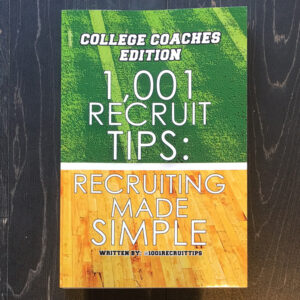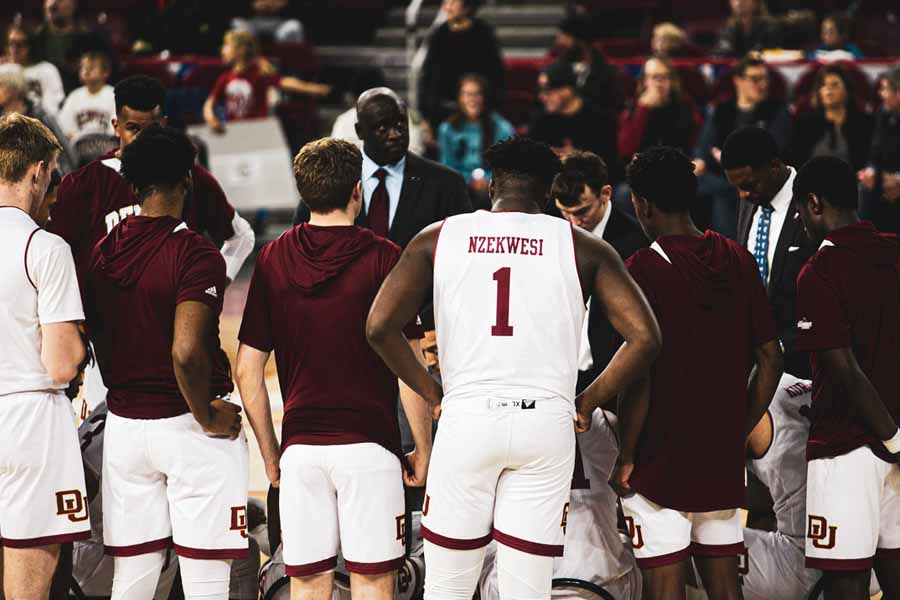One of the toughest aspects of evaluating top players is analyzing risk versus reward, if you encounter red flags during your research.
You will likely come across players who can be big playmakers for you– everything impresses you– until you start getting info that they have major legal, drug, attitude, academic or family issues.
Are you willing to take a high-risk (and high-maintenance) player who is very talented… or would you rather give up some of the drama and stress and take a player who is a little less talented but more dependable? Will this potential top recruit negatively influence and impact your team chemistry and lockerroom, will they bring other players down with them? Could they potentially cost you your job?
Ultimately, it’s the head coaches and Athletic Director’s decision when it comes to signing or even recruiting red-flag players. As a staff, you need to discuss what will and what won’t be accepted– and go ahead and eliminate those prospects who don’t fit your staff’s (and university’s) standards early and move on!
Character is a key component to trust—and trust is essential if you want to win. You have to be able to trust your team, so recruit with this in mind.
Not only do you need to consider the prospect, you need to take a look at their parents and circle of close friends, mentors and family. Once enrolled, they will have numerous people in their ears– will they be positive or negative influences? Is the player easily influenced by this circle, or are they looking to stand on their own? Will their parents be complaining about playing time, influencing the player’s attitude? Will their parents be calling your office weekly or daily, trying to tell you how to do your job? How parents carry themselves during the recruiting process only gets magnified once their child is enrolled — are you ready to take them on as well?
Players CAN change– but it’s a game of chances and only capable within a small percentage of people. These are the type of gambles that can disrupt your career, if big enough. Players can change if their motivation is big enough– their love for the game, an education, draft chances… I’ve seen players mature under the right leadership. But for many players, it’s a long, rough road to get there, and sometimes only a temporary change. Does this player bring the strengths that would make it worth dedicating that much extra time and effort on?
Take a page from NFL scouts: they ask receptionists, lunch ladies, trainers, coaches, stadium security guards and anyone else that a player may come in contact with to find out their true colors—not just how they act around coaches or perform on the field. An NFL prospects ‘true colors’ are almost as important as their athletic ability when it comes to breaking down the top talent. How is the player mentally, spiritually and what type of person are they? How do they handle success, how do they handle adversity? NFL teams are making decisions between players and investing millions and millions of dollars into their draft picks—they need to know about every aspect of their life. YOU should take that same consideration when evaluating players. Sometimes it’s more about what they’re not telling you that you need to look into. Do your research!
THOUGHTS TO CONSIDER:
• Will the prospect negatively impact the chemistry or personality of your team and lockerroom? Will they peer pressure other players into trouble?
• Have they had issues in the past? Have they changed their ways and stayed clean over the last year or two?
• Will they be admitted into the University and be able to actually enroll? Do you think they’ll make it through Academics, Compliance and Admissions approvals?
• Can they be successful there outside of sports? Will they be able to make it through their freshman and sophomore years? If redshirting, can they stay out of trouble the year that they’re on the bench?
• Are they likely to embarrass the University or program?
BOOK: Order ‘Recruiting Made Simple’ with hundreds of recruiting tips for college coaches!
• Will you have to pull teeth each step of the way to get them to go to class or turn in papers? Academic problems are often more of an issue of effort, not necessarily intelligence. Will you be babysitting them daily to do their homework?
• Most likely, issues become even more magnified when they move to the bigger stage of college sports. Can they handle it?
• Are you willing to put up with their parents and mentors for four years? What “mentors” are around them?
• Are they bringing a negative circle of friends with them? Will they be bringing negativity to your community?
• Will you be getting 2am phone calls about this player being in trouble?
• When discussing their past, are they just telling you what you want to hear or do you think they can now be trusted?
• What attitude do they have on social media? How do they carry themselves around peers?





